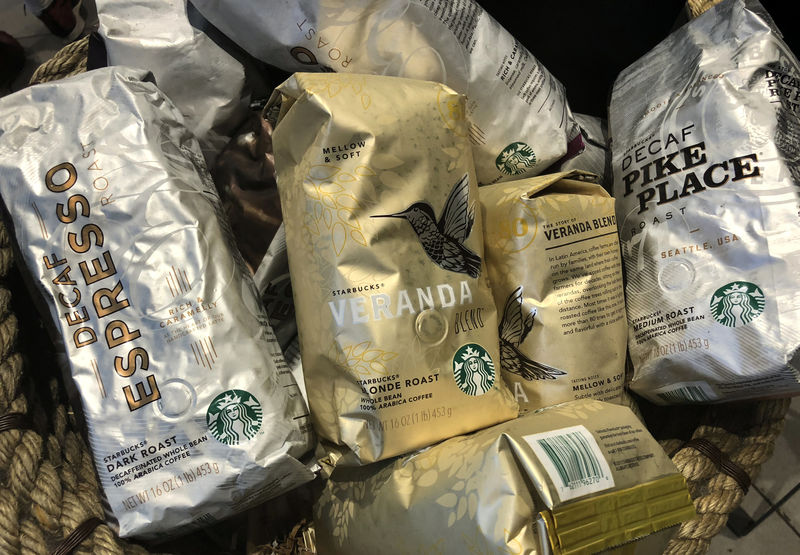By Lisa Baertlein and Martinne Geller
LOS ANGELES/LONDON (Reuters) - Swiss-based Nestle , the world's largest food and beverage company, will pay Starbucks Corp (NASDAQ:SBUX) $7.15 billion in cash for exclusive rights to sell the U.S. chain's packaged coffees and teas around the world, tying a premium brand to Nestle's global distribution muscle.
The agreement announced on Monday could rev up Starbucks' roughly $2 billion business selling packaged Starbucks coffee, Teavana tea and other products through grocery stores and other retailers, including in China.
The alliance, which amounts to a licensing arrangement, frees Seattle-based Starbucks to focus on improving its mainstay U.S. cafe business, where traffic growth has stalled amid competition from fast-food chains and upscale coffee houses, while rapidly adding shops in China.
Starbucks will use proceeds to increase planned stock buybacks to $20 billion from $15 billion through fiscal 2020. It said the deal would add to earnings per share by 2021. Nestle said it expects the alliance to add to its earnings by 2019, but will not alter its share buyback plans.
In addition to the cash payment, Starbucks will receive revenue from product sales and royalties.
"This global coffee alliance will bring the Starbucks experience to the homes of millions more around the world through the reach and reputation of Nestle," said Starbucks Chief Executive Kevin Johnson, calling the arrangement a brand amplifier.
"That would have taken a lot of capital and years to build outside the U.S.," John Culver, Starbucks' group president for international and channel development, said on a conference call with analysts.
Nestle Chief Executive Mark Schneider has made coffee a strategic priority as he tries to convince uneasy shareholders, including activist Third Point, that he can boost the sprawling group's performance.
The alliance could bolster Nestle's position as the world's biggest coffee company atop a fast-changing landscape. Rival JAB Holdings, a private investment firm of Europe's billionaire Reimann family, narrowed the gap with Nestle with a recent series of acquisitions, including Peet's Coffee & Tea and Keurig Green Mountain.
In January, Nestle sold its U.S. confectionery business to Ferrero. It had been losing ground in the United States confectionery sector as rivals moved towards healthier products.
Nestle, which will take on about 500 Starbucks employees, will not buy any industrial assets as part of the deal. Shares in Nestle rose about 1.6 percent in Switzerland, while Starbucks shares slipped 0.5 percent to $57.37.
RICHER BREW
Coffee is popular with younger customers who have grown up with Starbucks and are willing to pay for exotic beans and specialty drinks that translate into richer profit margins than mainstream packaged food.
The agreement will strengthen Nestle's position in the United States, where it is the No. 5 player with less than 5 percent of the market. Market leader Starbucks has a 14 percent share, according to Euromonitor International. Other big players are growing as well, including Italy's Lavazza, which is now the world's No. 3.
Nestle CEO Schneider last year identified coffee as an area for investment. It bought Texas-based Chameleon Cold-Brew in November and took a majority stake in Blue Bottle Coffee, a small upscale cafe chain, in September. Starbucks, which in April reported a global drop in quarterly traffic to its established cafes, has been streamlining its business. It sold its Tazo tea brand to Unilever (LON:ULVR) for $384 million and closed underperforming Teavana retail stores. Starbucks plans to open 1,000 upscale Starbucks Reserve stores and a handful of Roastery coffee emporiums to take on high-end coffee rivals such as Intelligentsia Coffee & Tea and Blue Bottle.
Starbucks has long farmed out retail distribution of its packaged products to a company more specialized in that process, but the partnerships have not always been smooth.
Kraft began marketing and distributing bags of Starbucks coffee in grocery stores in September 1998. Starbucks ended the contract in March 2011, giving the business to privately held Acosta Inc. Acosta did not immediate return calls seeking comment.
Starbucks accused Kraft of multiple material breaches of contract, including mismanaging the brand, and in 2010 proposed a payment of $750 million to end the deal. In November 2013, an arbitrator told Starbucks to pay $2.76 billion for ending the partnership early.
The Kraft deal had been set to expire in March 2014, and would have renewed automatically for successive 10-year terms.
Nestle is also not shy when it comes to partnering with rivals through licensing deals or joint ventures, having reached arrangements with General Mills' and Hershey, among others.
